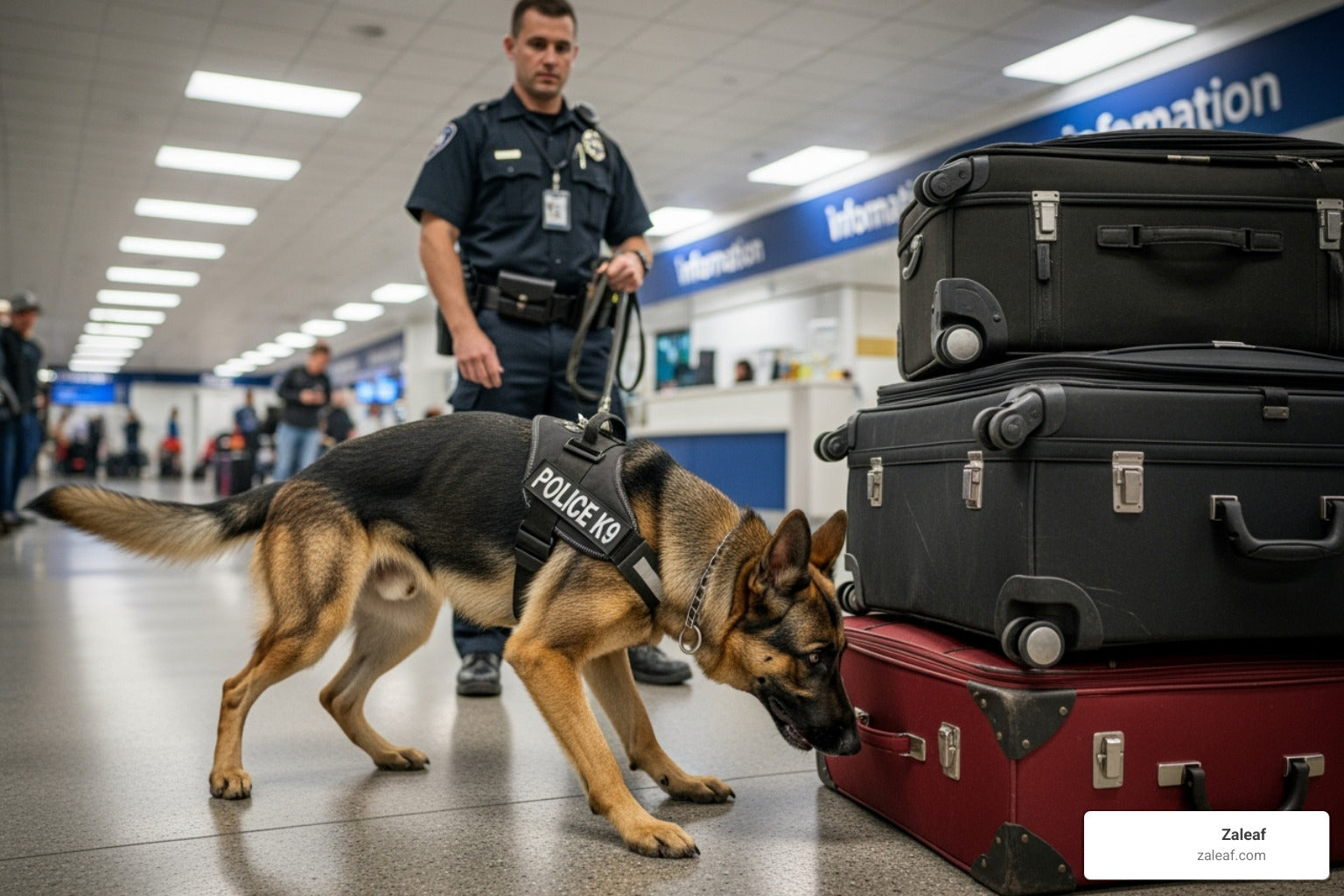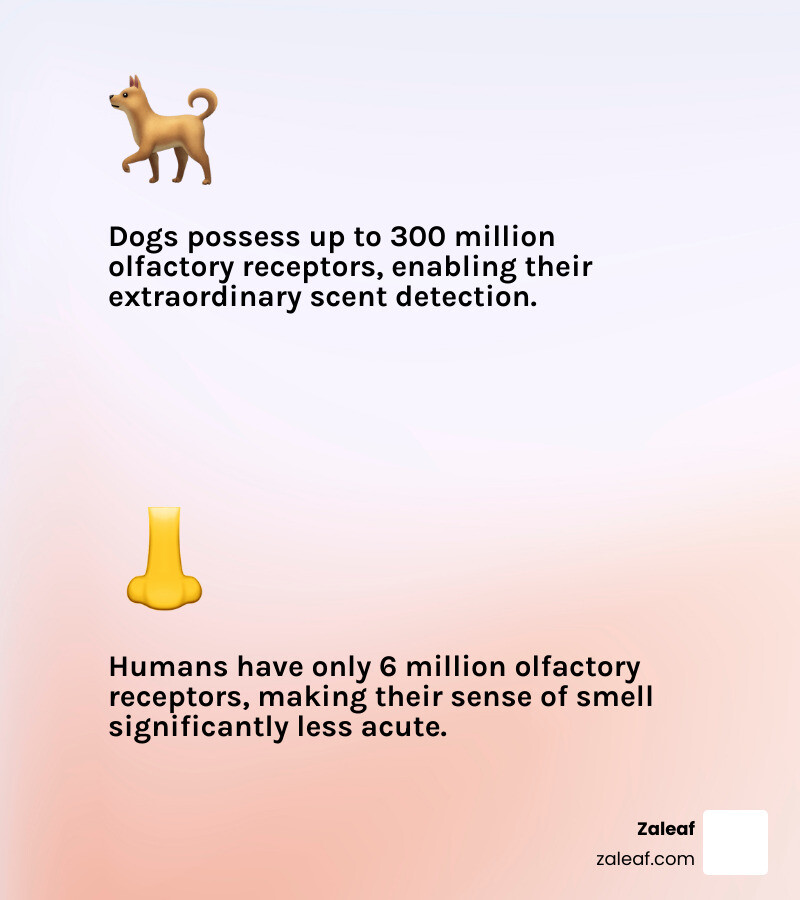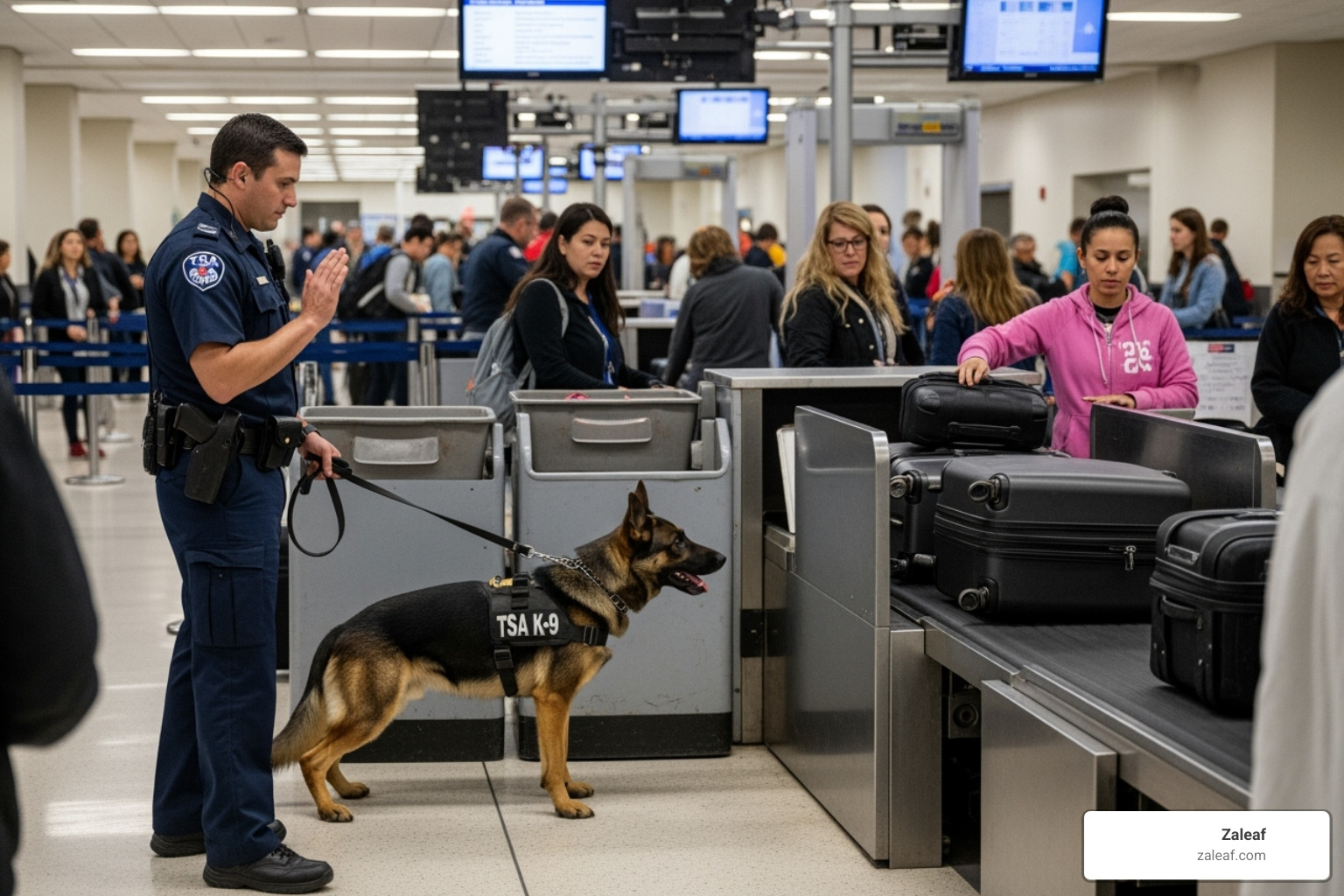Gummy Bears Beware—Can Drug Dogs Really Smell THC Edibles?

The Truth About Drug Dogs and THC Gummies
Can drug sniffing dogs smell THC gummies? Yes, drug-sniffing dogs can detect THC gummies and other cannabis edibles despite their appealing disguise as regular candy. Their extraordinary sense of smell allows them to identify the specific chemical compounds (terpenes) present in cannabis, even when masked by sweet flavors and food ingredients.
Quick Answer:
- Detection ability: Dogs can smell THC in gummies, brownies, chocolates, and other edibles
- Why they detect it: Dogs are trained to smell terpenes like caryophyllene oxide, not THC itself
- Masking doesn't work: Food flavors, packaging, and "smell-proof" bags rarely fool trained K-9s
- Legal complexity: Dogs can't tell the difference between legal hemp-derived and illegal marijuana-derived THC
Picture this: you're heading to a music festival with some cannabis edibles in tow, wondering if those innocent-looking gummy bears could land you in trouble with law enforcement. It's a common concern in our evolving cannabis landscape, where legal and illegal products often look identical.
The science behind canine detection is fascinating yet sobering. Dogs possess 10,000 to 100,000 times more sensitivity to smell than humans, with up to 300 million olfactory receptors compared to our measly 6 million. This means your carefully hidden stash isn't as secret as you think.
As Max Shemesh from Zaleaf, I've spent years navigating the complex world of cannabinoid products and understand the real concerns consumers face about can drug sniffing dogs smell THC gummies and the legal implications. My experience in the hemp industry has shown me that knowledge is your best defense when it comes to understanding detection risks and staying compliant with evolving cannabis laws.

Easy can drug sniffing dogs smell thc gummies glossary:
The Science of Scent: How Drug Dogs Detect Contraband
Ever wonder what makes a drug dog so incredibly good at their job? It's not magic—it's pure science combined with some seriously impressive training. When we talk about drug-sniffing dogs, we're really talking about four-legged detection machines that can smell things we can't even imagine.
Dogs are far more intelligent than we give them credit for. But their intelligence is just one piece of the puzzle. The real star of the show is that incredible nose.
How a Dog's Incredible Nose Works
A dog's nose is basically a supercomputer designed for smell. While you and I have around 6 million olfactory receptors, dogs pack in a whopping 300 million. That's not just a little bit better—it's 10,000 to 100,000 times more sensitive than our human noses.
But here's where it gets really wild. Dogs have this special organ called the Jacobson's organ that we humans don't have. It's like having a secret smell detector that picks up chemical compounds we can't even sense. Think of it as their built-in chemistry lab.
When a dog sniffs, they're not just breathing—they're analyzing. Their nose can separate the air they breathe from the air they use for scent detection. This means they can keep "reading" smells continuously without getting tired or overwhelmed.
Picture walking into a bakery and smelling "fresh bread." A dog walks into that same bakery and smells flour, yeast, salt, butter, eggs, and maybe even the metal from the baking pans—all as separate, distinct scents. They can isolate any one of these smells and ignore all the delicious distractions around it.
This incredible ability is exactly why can drug sniffing dogs smell THC gummies even when they're mixed with sugar, artificial flavors, and other food ingredients. To them, each component has its own unique scent signature.
What Are Drug Dogs Trained to Smell?
Here's something that might surprise you: drug dogs aren't actually trained to smell "drugs." They're trained to detect specific volatile organic compounds (VOCs) that these substances give off. It's like teaching them to recognize a person's unique perfume rather than the person themselves.
For cannabis products, dogs are typically trained to detect terpenes—those aromatic compounds that give cannabis its distinctive smell. The main ones they focus on are caryophyllene oxide and beta-caryophyllene. These compounds are present whether you're dealing with flower, edibles, or any other cannabis product.
The training process is actually pretty heartwarming. It's all about positive reinforcement and turning detection into a fun game. Dogs learn to associate the target scent with their favorite reward—usually a special toy or treat. When they smell the target compound, they give their trained alert (like sitting or pointing), and then they get their reward.
A well-trained detection dog can learn to recognize multiple substances over time. They might be trained to detect cocaine, heroin, methamphetamine, or even fentanyl. Some dogs are cross-trained for explosives too. But remember, they're not smelling the actual drug—they're smelling the specific chemical signature that drug gives off.
This is crucial to understand when wondering about THC gummies. The dog isn't thinking "that's marijuana"—they're thinking "that's the terpene smell I was trained to find, and finding it means I get my favorite toy!"
Common Breeds Used for Scent Detection
Not every dog can become a detection superstar, but some breeds are naturally built for the job. German Shepherds are probably the most famous—they're smart, loyal, and have that perfect combination of drive and focus. Labrador Retrievers are another favorite because they're incredibly trainable and have that eager-to-please personality.
Belgian Malinois are like the athletes of the dog world—high energy and laser-focused when they're working. Beagles might be smaller, but they were literally bred for scent work and have noses that rival much larger dogs. Bloodhounds are the ultimate scent specialists, capable of following trails that are days old.
These breeds aren't just chosen for their noses, though. They need the right temperament to work in busy airports, crowded festivals, or tense traffic stops. They have to stay calm, focused, and responsive to their handler no matter what's happening around them.
The partnership between dog and handler is what makes the whole system work. The dog provides the incredible nose, but the human provides the training, interpretation, and decision-making that turns a scent alert into actionable intelligence.
Can Drug Sniffing Dogs Smell THC Gummies and Other Edibles?
This is the million-dollar question that keeps cannabis users up at night. The whole appeal of edibles is their innocent appearance—a gummy bear looks like candy, a brownie smells like chocolate, and a mint could be mistaken for a breath freshener. But here's the thing: a dog's nose doesn't care about your clever disguise.

The Straight Answer: Yes, They Can
Let's cut to the chase: can drug sniffing dogs smell THC gummies? Absolutely, yes. Those sweet, fruity flavors that make your gummies taste amazing? They're basically useless against a trained K-9's nose. It's like trying to hide a campfire by lighting a candle next to it—the dog can smell both, separately and clearly.
Here's what happens when a dog encounters your "sneaky" strawberry gummy. While you smell delicious fruit candy, the dog is picking up the distinct terpenes from the cannabis. Remember those 300 million olfactory receptors we talked about? They're working overtime to separate every single scent molecule.
The dog's training kicks in too. These aren't your neighbor's curious golden retriever—these are professional working dogs with serious discipline. They're not interested in eating your treats. They've been conditioned to find specific chemical signatures and alert their handler when they detect them. No amount of sugar coating changes that fundamental reality.
Interestingly, The Journal of Analytical Toxicology reported a study that found police canines to be less effective at detecting edible cannabis compared to raw flower. The cooking process does alter some compounds, making the scent profile slightly different. But "less effective" doesn't mean "unable to detect." It just means the dog might take an extra sniff or two.
Does the Type of Edible Affect Detection?
Different types of edibles do create varying levels of detection difficulty, though none are foolproof. Gummies tend to have strong artificial flavors that create a more complex scent environment, but those terpenes are still broadcasting loud and clear to a trained nose.
Baked goods like brownies and cookies present an interesting case. The baking process can break down some volatile compounds, potentially making them slightly harder to detect. The rich aromas of chocolate, vanilla, and butter create more scent layers for the dog to sort through. However, homemade edibles often pose less of a challenge because they're typically made with less refined cannabis products and aren't professionally packaged.
Chocolates offer perhaps the strongest natural masking effect due to cocoa's intense aroma. But again, we're talking about a dog that can detect a teaspoon of sugar in two Olympic-sized swimming pools. That chocolate smell isn't hiding anything from them.
The potency level of your edibles also plays a role. Higher concentrations of THC mean more terpenes, which equals a stronger scent signature. But don't get too confident with low-dose edibles—even a 2.5mg gummy contains enough detectable compounds to trigger an alert.
Products made with concentrated THC oils or cannabutter often have different scent profiles than those made with flower. The extraction process can concentrate certain terpenes while eliminating others, creating a unique chemical fingerprint that trained dogs learn to recognize.
The Packaging Predicament: Can You Fool a K-9's Nose?
This is where things get really interesting—and where most people's confidence gets shattered. The internet is full of "foolproof" methods to hide edibles from drug dogs, but the reality is much more sobering.
Vacuum sealing is probably the most popular method, and it's better than nothing. But here's the problem: plastic is microscopically porous. Those tiny scent molecules will eventually find their way out, especially if the package sits around for a while. Plus, if you handled the edibles before sealing or got any residue on the outside of the bag, game over.
Mylar bags are the gold standard for odor control, with multiple layers designed to block scent molecules. They're definitely more effective than regular plastic, but they're not magical force fields. Time and temperature can still allow some scent escape.
The masking method is where people get really creative—and really disappointed. Coffee grounds, strong perfumes, dryer sheets, even gasoline—none of these "red herrings" work against a properly trained dog. It's like trying to hide a conversation by playing loud music. The dog can still hear both sounds separately.
Multiple layers of packaging might slow down scent dispersion, but remember, we're dealing with noses that can detect scents in parts per trillion. That's like finding a single grain of sand on a beach.
Some people swear by specialty scent-proof bags, and while these offer the best protection available, no product can guarantee complete invisibility to a dog's nose. The manufacturers know this too—check the fine print on any "scent-proof" product.
The hard truth is that cross-contamination is your biggest enemy. Even if you have the perfect packaging, touching the edibles and then touching the outside of the container can leave enough residue for a dog to detect. It's incredibly easy to contaminate surfaces without realizing it.
At Zaleaf, we focus on legal compliance and quality rather than helping people hide products. Our 3rd party testing ensures you know exactly what you're getting, and our discrete packaging is designed for privacy, not evasion.
The Legal Labyrinth: Detection, Legality, and Your Rights
The legal landscape surrounding cannabis is a patchwork of federal and state laws that can make your head spin faster than a dog chasing its tail. This complexity directly impacts how drug dog alerts are handled, especially when it comes to products like THC gummies.

Marijuana vs. Hemp-Derived THC: Can a drug sniffing dog tell the difference?
Here's where things get really interesting. The 2018 Farm Bill created a legal distinction that makes perfect sense to lawyers and absolutely no sense to drug dogs. Hemp-derived products containing less than 0.3% Delta-9 THC by dry weight are federally legal, while marijuana-derived THC remains a Schedule 1 controlled substance under federal law.
But here's the kicker: can drug sniffing dogs smell THC gummies and tell you whether they're legal or illegal? Not a chance. A German Shepherd might be smart enough to open doors and understand basic commands, but constitutional law isn't exactly covered in K-9 training academy.
Drug dogs are trained to detect cannabis terpenes, which are present in both legal hemp and illegal marijuana. When that dog sits and stares at your backpack, they're not making a legal judgment—they're just doing what they've been trained to do. The scent of caryophyllene oxide doesn't come with a legal disclaimer attached.
This creates some real headaches in the legal world. A dog's alert typically establishes probable cause for a search, even if your gummies are completely legal. Some courts have started questioning whether the "plain smell" doctrine still applies in states where cannabis is legal, but this varies wildly depending on where you are.
That's why we at Zaleaf put every product through rigorous 3rd party testing. When you're carrying our gummies, you've got the lab results to prove they're legal. It's like having a hall pass from chemistry class. For a deeper dive into the legal maze, check out our guide: Gummy Bear or Gummy Beware? The Truth About THC Gummies Legality.
K-9s in Action: Where You'll Encounter Drug Dogs
Drug-sniffing dogs aren't just hanging out at random street corners—they're strategically deployed in specific locations where authorities want to deter and detect illegal substances. Understanding where you're likely to encounter them can help you make informed decisions.
Airports are probably the most common place you'll see these four-legged law enforcement officers. While the Transportation Security Administration's stance on cannabis infused products focuses primarily on security threats like explosives and firearms, they'll happily hand you over to local law enforcement if a dog alerts on your carry-on.
Traffic stops are another hotspot for K-9 encounters, especially if an officer develops reasonable suspicion during the stop. The good news is that the Supreme Court ruled in Rodriguez v. United States that police can't hold you indefinitely just to wait for a drug dog to arrive.
Public events and music festivals often deploy drug dogs to screen attendees. Nothing kills the vibe quite like a Labrador Retriever with a badge, but it's become increasingly common at large gatherings.
Schools use drug dogs for locker inspections and parking lot sweeps, while border crossings and customs checkpoints are obvious locations for K-9 deployment. The frequency and intensity of these operations can shift based on local laws, enforcement priorities, and current events.
If a K-9 Alerts: Knowing Your Rights and Next Steps
Even if you're carrying perfectly legal hemp-derived products, a drug dog alert can turn your day upside down. Knowing your rights can make the difference between a minor inconvenience and a major legal headache.
Stay calm and be polite—this isn't the time to debate the finer points of the 2018 Farm Bill with Officer Johnson. Panicking or getting aggressive will only make things worse for everyone involved.
You have the right to remain silent, and you should use it. Politely state that you wish to remain silent and would like to speak with an attorney. This isn't an admission of guilt—it's smart legal strategy.
Do not consent to a search unless you absolutely have to. If they ask for your consent, you have the right to refuse. Simply say, "I do not consent to any searches." Be polite but firm.
Here's the tricky part: if a drug dog alerts on your property, this often establishes probable cause for a search, even without your consent. The Fourth Amendment protects you against unreasonable searches and seizures, but probable cause is a legal exception to that protection.
If you're carrying legal hemp products, have your Certificate of Analysis (COA) ready to show. This lab result proves your THC content is below the legal limit. Don't argue or lecture—just calmly present the documentation.
Never physically resist a search, even if you believe it's illegal. You can verbally object and state that you don't consent, but physical resistance will only add charges to your day. If you're detained or arrested, immediately ask for a lawyer and don't answer any questions without legal counsel present.
While we ensure all Zaleaf products are 100% legal and properly documented, the reality is that drug dogs can't read lab reports. Being prepared and informed is your best defense in these situations. For more insights on how long THC might remain detectable in edibles, check out our article: Staying Power: How Long Do THC Gummies Remain Detectable?.
Frequently Asked Questions about Drug Dogs and THC Gummies
The world of cannabis legality and drug detection can feel like navigating a maze blindfolded. We get tons of questions from customers who want to understand the real risks and realities of traveling with or carrying THC products. Let's tackle the most common concerns head-on.
Can airport dogs smell THC gummies?
Airport security dogs can absolutely detect THC gummies, but here's where it gets interesting. The Transportation Security Administration (TSA) has a pretty clear stance: their primary job is finding bombs and weapons, not your personal stash of gummies. Their Transportation Security Administration's stance on cannabis infused products focuses on security threats rather than drug enforcement.
But here's the catch - if a drug dog does alert on your THC gummies, TSA will hand you over to local law enforcement faster than you can say "but it's legal in my state." Local police don't care about TSA priorities; they're focused on drug laws, which vary wildly depending on where you are.
Even if you're carrying perfectly legal hemp-derived gummies with proper lab results, you could still face confiscation or questioning. The dog can't read your Certificate of Analysis, and neither can the officer in those first crucial moments.
The reality? It's often impossible to know exactly how airport dogs are trained for your specific situation. Some focus on explosives, others on narcotics, and some do both. Your safest bet is leaving the gummies at home when flying, especially if you're traveling to states where cannabis remains illegal.
If you absolutely must travel with legal hemp products, keep those lab results handy and be prepared for potential confiscation. Don't argue with security - it never ends well.
Do "smell-proof" bags actually work against drug dogs?
High-quality "smell-proof" bags can significantly reduce odor, but calling them foolproof would be like calling a umbrella waterproof in a hurricane. They help, but they're not magic.
The best multi-layered Mylar bags and vacuum-sealed containers can dramatically cut down on detectable scent. However, a dog's 300 million olfactory receptors don't play by our rules. Even the tiniest scent molecules escaping through microscopic pores can trigger an alert.
The biggest problem? Cross-contamination. If you touched your gummies and then touched the outside of the bag, you've basically left a scent trail that screams "cannabis here!" This handler error trips up more people than faulty bags.
Time also works against you. The longer you store something, the more likely scent molecules will find their way out. Think of it like trying to keep water in a bucket with tiny holes - eventually, some will leak through.
High-quality smell-proof bags do reduce risk, but they're not a guarantee. They're more like wearing a seatbelt - smart protection that improves your odds, but not a license to drive recklessly.
Can a drug dog detect Delta-8 or other legal cannabinoids?
This question hits right at the heart of our confusing legal landscape. Yes, drug dogs can detect Delta-8 and other legal cannabinoids, and here's why this creates such a headache.
Dogs aren't trained to distinguish between Delta-8 versus Delta-9 THC. They're trained to detect the terpenes that are present in all cannabis plants, regardless of whether they're hemp or marijuana. To a dog's nose, your legal Delta-8 gummy smells remarkably similar to an illegal marijuana edible.
When a dog alerts on your Delta-8 gummies, the officer doesn't initially know whether you're carrying legal hemp products or illegal marijuana. The dog's alert gives them probable cause to search, and then it becomes your job to prove your product's legality through lab testing.
This creates real-world problems. Even though Delta-8 is federally legal under the 2018 Farm Bill, you could still face detention, searches, and questioning based on a dog's alert. The legal confusion runs so deep that we wrote an entire guide on this topic: Are Delta-8 Gummies Legal? Clearing the Haze Around THC Treats.
The bottom line? A dog's nose doesn't understand legal nuances. They smell cannabis compounds and alert - period. Whether those compounds come from legal hemp or illegal marijuana is a legal question that gets sorted out after the alert, not before.
At Zaleaf, we ensure all our products undergo 3rd party testing specifically so you have the documentation needed to prove legality if questioned. But remember - having legal products doesn't prevent the initial detection or the stress of explaining yourself to law enforcement.
Conclusion
So, can drug sniffing dogs smell THC gummies? The answer is crystal clear: absolutely yes. These four-legged detection experts possess an incredible superpower that puts our human noses to shame. With their hundreds of millions of olfactory receptors working overtime, they can easily sniff out the telltale chemical signatures of cannabis, even when it's cleverly disguised as your favorite gummy bear or chocolate brownie.
The sweet scents of strawberry, chocolate, or vanilla that might fool us humans? They're no match for a trained K-9's nose. These dogs can literally smell through the flavoring to detect the underlying terpenes that give cannabis its distinctive chemical fingerprint. Even those fancy "smell-proof" bags and vacuum-sealed packages aren't the foolproof solutions many people think they are.
But here's where things get interesting—and a bit complicated. While drug dogs are incredibly skilled at detection, they're not lawyers. They can't tell the difference between federally legal hemp-derived THC and federally illegal marijuana-derived THC. To them, cannabis is cannabis, regardless of whether it's a legal Delta-8 gummy or an illegal street edible.
This creates some real-world challenges. A dog's alert on your perfectly legal hemp gummies can still lead to a search and some uncomfortable questions. That's why knowing your rights is so important. Stay calm, be polite, and remember that you have the right to remain silent and refuse consent to searches when legally possible.
The key takeaway? Handler training and legal compliance matter more than ever in our evolving cannabis landscape. At Zaleaf, we understand these complexities, which is why we're committed to providing 100% legal cannabis products backed by rigorous 3rd party testing. Every product comes with clear documentation proving its legal status, giving you peace of mind and the paperwork you might need.
We believe in empowering our customers with knowledge because being an informed consumer is your best defense. Whether you're exploring therapeutic benefits or simply enjoying a relaxing evening, understanding the realities of drug detection helps you make smarter choices.
The cannabis world is changing rapidly, but the science behind canine detection remains constant. These remarkable dogs will continue doing what they do best—following their noses. Your job is to stay informed, stay legal, and enjoy responsible use of quality products.


